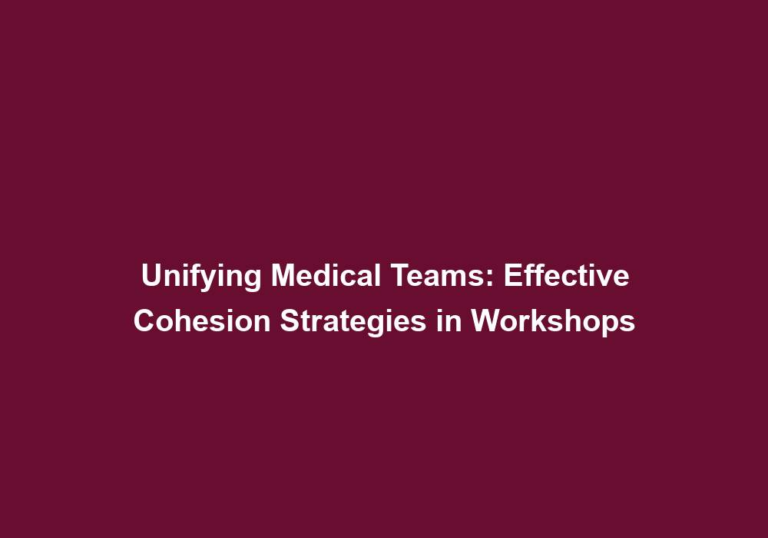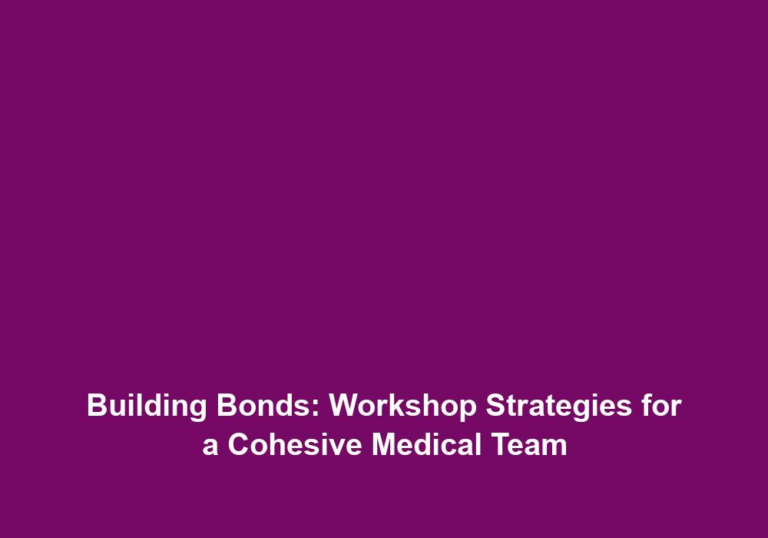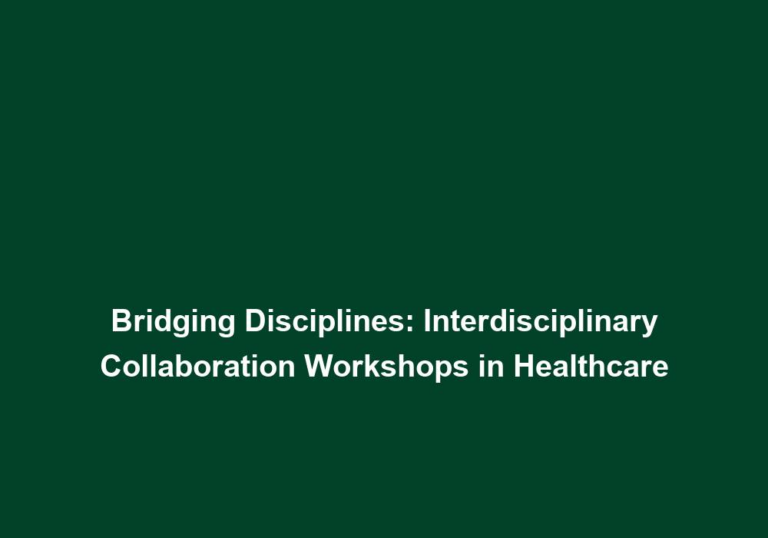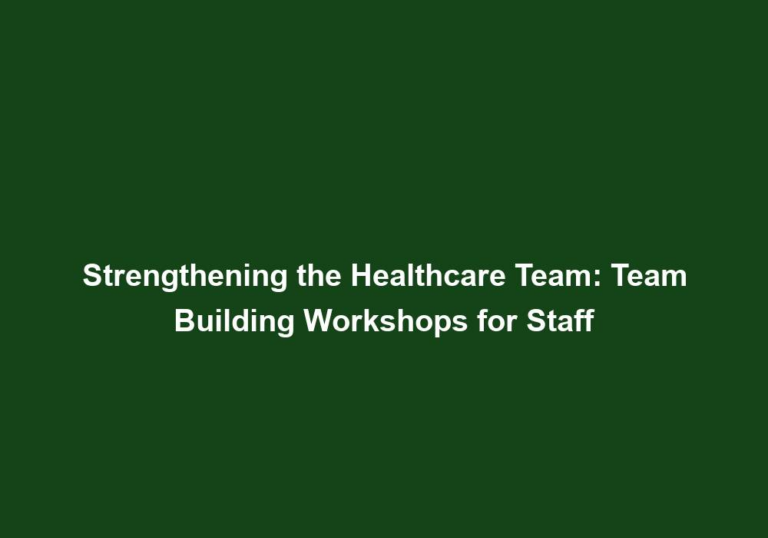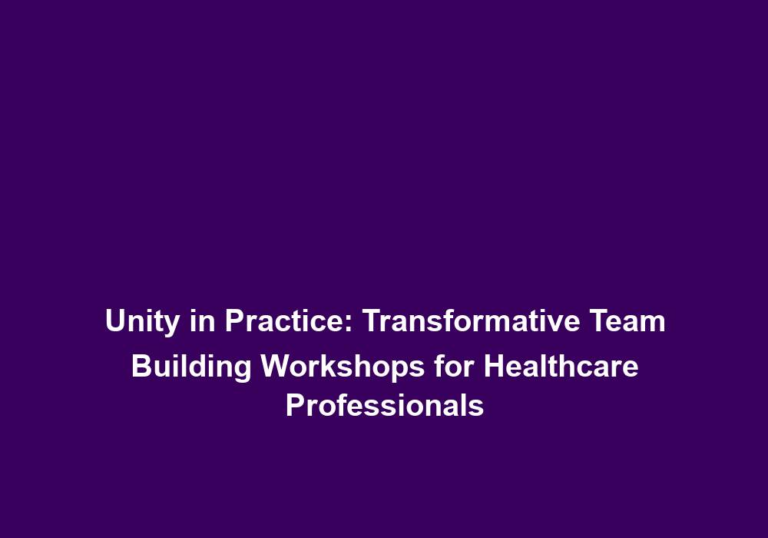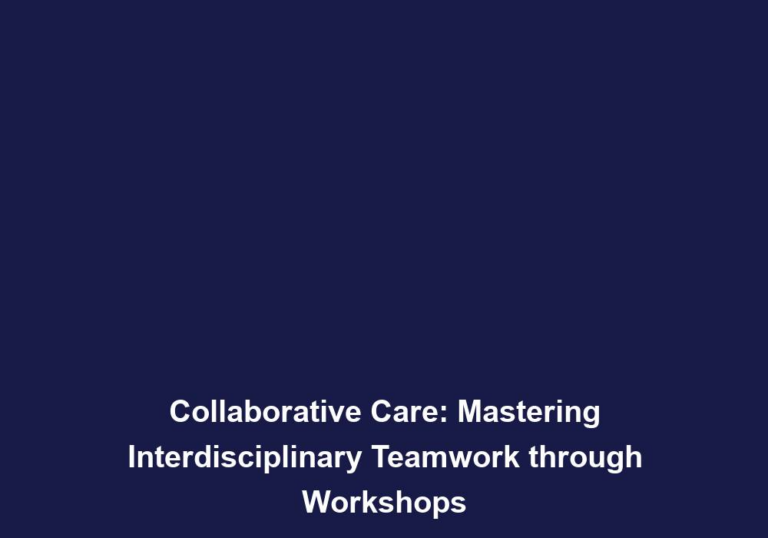Unifying Medical Expertise: Workshops for Interdisciplinary Collaboration
In the ever-evolving field of medicine, collaboration and interdisciplinary approaches have become essential for providing the best possible care to patients. With advancements in medical technology and an increasing understanding of the complexity of diseases, healthcare professionals from various backgrounds are realizing the value of working together to achieve optimal outcomes.
The Importance of Interdisciplinary Collaboration
The traditional approach in medicine involved specialists working within their respective silos, often missing out on valuable insights from other disciplines. However, as healthcare becomes more patient-centered and complex, the need for interdisciplinary collaboration has become evident. By bringing together professionals from diverse fields, such as physicians, nurses, pharmacists, therapists, and social workers, a comprehensive understanding of a patient’s condition can be achieved.
Collaboration among healthcare professionals helps in identifying potential issues or complications that may have otherwise gone unnoticed. It enhances the overall quality of care, as valuable input from different perspectives contributes to better decision-making and treatment planning. Moreover, interdisciplinary collaboration leads to improved patient satisfaction and outcomes, reduced healthcare costs, and increased professional satisfaction among healthcare providers.
The Role of Workshops in Unifying Medical Expertise
Workshops provide a platform for healthcare professionals to come together, exchange knowledge, and learn from one another’s experiences. These interactive sessions create a conducive environment for fostering interdisciplinary collaboration and breaking down communication barriers among healthcare teams.
Benefits of Workshops
-
Knowledge Exchange: Workshops facilitate knowledge sharing between professionals from different disciplines. Participants can learn about the latest research findings, treatment modalities, and best practices in their respective fields. This exchange of information empowers healthcare professionals with a broader understanding of various specialties, enabling them to provide comprehensive care to their patients.
-
Networking Opportunities: Workshops provide an excellent opportunity for healthcare professionals to network with peers from various disciplines. Building professional relationships and collaborations can lead to ongoing communication and future collaborative projects. These networks can be invaluable in providing patients with multidisciplinary care and accessing specialized expertise when needed.
-
Enhanced Communication: Effective communication is a cornerstone of interdisciplinary collaboration. Workshops often include interactive activities and discussions that improve communication skills among participants. By learning to effectively communicate with professionals from different backgrounds, healthcare providers can bridge the gap between disciplines and ensure a unified approach to patient care.
-
Breakdown of Stereotypes: Workshops allow professionals to challenge stereotypes and preconceived notions about other disciplines. Through open discussions and exposure to different perspectives, participants gain a better understanding of the expertise and contributions of their colleagues from other fields. This promotes mutual respect and appreciation, fostering a culture of collaboration and teamwork.
Workshop Topics and Format
When organizing workshops for interdisciplinary collaboration, it is crucial to select relevant topics that address the specific challenges faced by healthcare professionals. Some potential workshop topics include:
-
Effective Communication Strategies: This workshop can focus on enhancing communication skills, active listening, and understanding the language and terminology used by different disciplines. Participants can learn techniques for effective interdisciplinary communication, such as using plain language and avoiding jargon that may be unfamiliar to other professionals.
-
Case-Based Learning: Participants can analyze real-life patient cases to identify how the collaboration of multiple disciplines would enhance diagnosis, treatment planning, and patient outcomes. Through in-depth case discussions, healthcare professionals can understand the value of interdisciplinary collaboration in complex medical scenarios and learn how to leverage the expertise of different specialties.
-
Ethical Dilemmas in Interdisciplinary Care: This workshop can explore ethical issues that arise when multiple healthcare professionals are involved in decision-making. Discussions can revolve around respecting autonomy, shared decision-making, and addressing conflicts of interest. Participants can learn about ethical frameworks and guidelines for interdisciplinary care and practice effective ethical decision-making.
-
Team Building and Conflict Resolution: Building effective interdisciplinary teams requires addressing conflicts and fostering positive working relationships. This workshop can provide strategies for conflict resolution, team building, and fostering a collaborative culture. Participants can engage in team-building activities, role-playing exercises, and case simulations to practice effective teamwork and conflict resolution skills.
The format of workshops can vary, but ideally, they should include a mix of didactic lectures, interactive discussions, case studies, and hands-on activities. Engaging participants through group work, role-playing, and scenario-based exercises helps to reinforce the concepts of interdisciplinary collaboration.
Conclusion
In the rapidly advancing field of medicine, workshops that promote interdisciplinary collaboration are crucial for unifying medical expertise. By breaking down silos and encouraging healthcare professionals to work together, workshops facilitate knowledge exchange, enhance communication skills, foster networking, and promote a culture of collaboration.
Interdisciplinary collaboration has the potential to revolutionize patient care, ensuring comprehensive and holistic approaches to treatment. By investing in workshops that focus on unifying medical expertise, healthcare organizations and professionals can contribute to the advancement of healthcare and ultimately improve patient outcomes.


